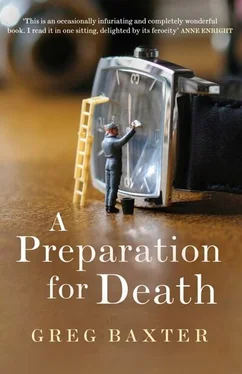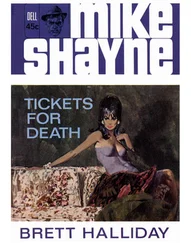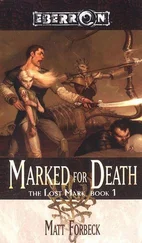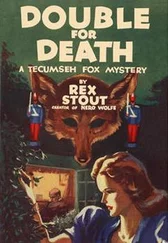The last time I visited, we took David’s guns out — he has dozens: pistols, shotguns, rifles — and shot at targets in a junked-out section of the farm. My mother sat on a frayed folding chair and held the ammunition, drinking iced tea. It was bright and muggy. David and I were all pretty bad shots, and my mother made mock-encouraging remarks when we missed. David said, Okay, Frances, let’s see what you can do. She took the rifle, complained about the glare, hitched into a forward-leaning stance, and hit everything. The beer cans we had placed on tree trunks and cardboard boxes flipped and bounced and tumbled off their perches, one after another. I guess we’ll have to move them farther back, she said.
The subject of the end of my marriage was avoided until it could no longer be, and later that day, perhaps it was the evening, I delivered a brief and abridged confession of my sins. She listened with a studied dread, nodding at times but mostly still. Reliving past horrors, I suppose. If I had thought about it, I would’ve abridged the story further, though it was already more of an excuse than a confession. I had been forthright with everybody else. I desired contempt, because I was beyond it, so great was my self-loathing. But with my mother I merely wanted it over.
I had caused her enough pain already. Between the eighth and ninth grades, I left her and Conroe to live with my father in San Antonio. I withdrew myself from her life at a time when she had nothing but an ignorant and loud-mouthed second husband and a family that was too religious to console her. It is easy to excuse the cruelties of children, since they cannot comprehend the weight of them on other people, but I have always understood and used the weakness others have for me. Though she is considerably more content with herself now, and with David, she has harboured the belief that I left because I loved my father more than her.
At the time, she knew I was in trouble at school, failing classes, getting in fights, but she did not know the extent of things. I was getting my ass kicked almost every day. And when I was not getting my ass kicked, I was hurrying from classroom to classroom, taking back-routes, trying to keep out of sight. All this came about, or at least began, because of something I said. One day during an off-season football practice — we were, in fact, playing baseball — I, without thinking, using a term my uncles used to refer to me, called a black kid boy . Perhaps I knew what it meant and used it anyway. If I was a racist then, I wasn’t aware of it. He punched me without any conversation, no taunts or intimidation. It was a jab that caught me on the cheek. There was a jolt, but it had not hurt — that struck me as totally impossible. Thinking of it now — no wonder, he was a few inches shorter than me and not as broad, and he was thirteen. Nevertheless I was terrified. A coach, from the other side of the field, told the black kid to leave me alone, not out of concern for my safety but because I was a puny waste of time: if you’re going to fight, he told the kid, pick somebody who’ll give you one. Nevertheless, the kid attacked me again. He punched me six or seven times. I was too scared to run, and I never raised a hand to defend myself, not even to cover my face. The kid walked away to finish the game. I hoped he had bored himself. I remember pins and needles in my arms and legs, not from fear, not precisely, but from a realization a thousand times more abominable — that I had not considered, and wouldn’t consider, the possibility of punching him back.
When the game ended he came at me once more. Again I did nothing. For about a week this continued. I’d be ambushed by fifty students who wanted to see the spectacle of the Boy Who Would Not Fight. The black kid eventually tired of giving me beatings, but just as soon as that crisis had gone by, another ten started. It had become obvious to everybody that I would not raise a hand against them. For months I was a punching bag, and humiliatingly it was almost always by boys smaller than me. Large galleries watched like a talk-show audience, just laughing, coaxing. Once, in a scene reminiscent of a gruesome Mafia docklands execution, three kids — this time they were much bigger — led me to an isolated spot, far behind the football field, in the middle of a school day, to beat me up. I did not beg or whimper, but I did not struggle either, nor try to run away. They began to push me around. While the ringleader watched, the other two tried to incite me. Ten minutes passed. The leader asked me if I knew why it was happening. I said nothing. I had stopped wondering what the reason was; all that consumed me was my inability to respond. These fights took place wholly within me. The two lost interest, but the third grew so angry at my inaction that he struck me anyway, just once. That too did not hurt, but I shat myself. A hard and giant turd, cleanly, was in my underwear. After they walked away, I pulled my jeans down, lifted it out in my palm, and left it in the street.
The vice-principal, in his office, once told me, For God’s sake, defend yourself! I told him I didn’t want to get detention. Detention! He slapped his forehead. On a weekend trip to San Antonio, that summer, I told my father I wanted to move in with him. He told my mother. Cowardice after cowardice after cowardice. And even now, back in east Texas, I am whipped, now and then, by a paroxysm of those memories. Sometimes I begin to perspire and must get up and walk. If not for my mother, I would never come back here. I would never drive through. I would never take a flight that flew over. In San Antonio, entering high school, I decided to stick up for myself, not because I wanted to, but because the truth of my nature was too tight around my neck. I got in a few fights, which did not last long, just to get over the fear of punching. Then I joined the swim team, grew a few inches, and nobody wanted to fight anymore. I used to lie in bed some nights and dream of killing. I still do. When I think of it, my heart grows lusty. I would like to beat someone to his death. Just to get the cowardice out of me.
On the evening of the 28th, my cousin Chris arrived. We were out back drinking beer in the warm night, and it seemed that we heard him from a very long way off: a high-pitched four-cylinder whine — overworked, threatening to evaporate — shattered the high countryside quiet, the silence over the treetops. It had rained for many days before I arrived, and the roads should have been impassable for a two-wheel-drive, but my mother explained that Chris simply buries the gas and flies down the gorge and up it.
It had been years. We shook hands — his hands are gigantic, almost cartoonish, like his father’s. He wore amber Ray-Bans. We put a few extra chairs in the living room, and we were all on top of each other. Chris and I were nearly the same person for a long time, when I first moved to Conroe. I was in the fifth grade and he was in the seventh, and we went to different schools, but we spent every evening and weekend together. He hated school and would never finish. He was an inventor, and took apart and rebuilt electronic devices — radios, microwaves, televisions — and drew schematic diagrams to understand them. If someone had figured out a way to interest him in school, he’d have become a professor. But now he installs car radios in a small Texas town, and talks without conviction of a plan to start his own business. I would like to say this doesn’t disappoint me, that one life is as admirable — or pointless — as the next, but sitting with him while he drank coffee and talked about his sick child and his plans to install a new septic tank I was reminded of the hopeless dreams and phantasmagoria of our childhoods — another old story, but how poignant they seem to us when we are made of them. He left after a third phone call from his impatient wife, and we heard him struggling up the gorge, and the high-pitched whine of the engine trailed away.
Читать дальше












